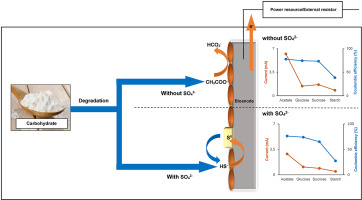当前位置:
X-MOL 学术
›
Water Res.
›
论文详情
Our official English website, www.x-mol.net, welcomes your feedback! (Note: you will need to create a separate account there.)
Understanding the complexity of wastewater: The combined impacts of carbohydrates and sulphate on the performance of bioelectrochemical systems.
Water Research ( IF 12.8 ) Pub Date : 2020-03-20 , DOI: 10.1016/j.watres.2020.115737 Fei Zhao 1 , Elizabeth S Heidrich 1 , Thomas P Curtis 1 , Jan Dolfing 1
Water Research ( IF 12.8 ) Pub Date : 2020-03-20 , DOI: 10.1016/j.watres.2020.115737 Fei Zhao 1 , Elizabeth S Heidrich 1 , Thomas P Curtis 1 , Jan Dolfing 1
Affiliation

|
Bioelectrochemical systems (BES) have long been viewed as a promising wastewater treatment technology. However, in reality, the performance of bioelectrochemical systems fed with real (and therefore complex) wastewaters is often disappointing. We have sought to investigate the combined impacts of complex substrates and presence of electron acceptors. In particular, this study illustrates and systematically evaluates the disparity in performance between a BES acclimatised with acetate and those acclimatised with more complex carbohydrates (glucose, sucrose or starch) and in the presence and absence of sulphate. Relative to acetate only, operating with complex carbohydrates reduced current by 73%-87% and coulombic efficiency by 4%-50%. Acclimation with complex carbohydrates seriously impeded the colonisation anode by Geobacteraceae, resulting in substantially reduced capacity to produce current (60.2% on average). Combined acclimation with sulphate further reduced current by 35% on average, and resulted in a total reduction of 83%-93% relative to the acetate control. However, the presence of an electrogenic sulphide-sulphur shuttle meant sulphate had little effect on the coulombic efficiency of the BES. The results indicate that a reduction in current and coulombic efficiency is, at present, an unavoidable consequence of operating a BES fed with complex wastewater. Researchers, designers and policy makers should incorporate such losses in both their plans and their prognostications.
中文翻译:

了解废水的复杂性:碳水化合物和硫酸盐对生物电化学系统性能的综合影响。
生物电化学系统(BES)长期以来一直被视为有前途的废水处理技术。但是,实际上,充满实际(因而复杂)废水的生物电化学系统的性能通常令人失望。我们试图研究复杂基质和电子受体的存在的综合影响。尤其是,这项研究说明并系统地评估了用乙酸适应的BES与用更复杂的碳水化合物(葡萄糖,蔗糖或淀粉)适应的BES在存在和不存在硫酸盐之间的性能差异。仅相对于乙酸盐,与复杂的碳水化合物一起使用可将电流降低73%-87%,库仑效率降低4%-50%。复杂碳水化合物的适应严重阻碍了土杆菌科的定殖阳极,导致生产电流的能力大大降低(平均60.2%)。与硫酸盐结合的驯化使平均电流进一步降低了35%,相对于醋酸盐对照组,总降低了83%-93%。但是,存在电硫化物-硫穿梭电,这意味着硫酸盐对BES的库仑效率影响很小。结果表明,电流和库仑效率的降低目前是操作装有复杂废水的BES不可避免的结果。研究人员,设计人员和政策制定者应将此类损失纳入其计划和预后。相对于醋酸盐对照组,总降低了83%-93%。但是,存在电硫化物-硫穿梭梭意味着硫酸盐对BES的库仑效率影响很小。结果表明,电流和库仑效率的降低目前是操作装有复杂废水的BES不可避免的结果。研究人员,设计人员和政策制定者应将此类损失纳入其计划和预后。相对于醋酸盐对照组,总降低了83%-93%。但是,存在电硫化物-硫穿梭梭意味着硫酸盐对BES的库仑效率影响很小。结果表明,电流和库仑效率的降低目前是操作装有复杂废水的BES不可避免的结果。研究人员,设计人员和政策制定者应将此类损失纳入其计划和预后。
更新日期:2020-03-21
中文翻译:

了解废水的复杂性:碳水化合物和硫酸盐对生物电化学系统性能的综合影响。
生物电化学系统(BES)长期以来一直被视为有前途的废水处理技术。但是,实际上,充满实际(因而复杂)废水的生物电化学系统的性能通常令人失望。我们试图研究复杂基质和电子受体的存在的综合影响。尤其是,这项研究说明并系统地评估了用乙酸适应的BES与用更复杂的碳水化合物(葡萄糖,蔗糖或淀粉)适应的BES在存在和不存在硫酸盐之间的性能差异。仅相对于乙酸盐,与复杂的碳水化合物一起使用可将电流降低73%-87%,库仑效率降低4%-50%。复杂碳水化合物的适应严重阻碍了土杆菌科的定殖阳极,导致生产电流的能力大大降低(平均60.2%)。与硫酸盐结合的驯化使平均电流进一步降低了35%,相对于醋酸盐对照组,总降低了83%-93%。但是,存在电硫化物-硫穿梭电,这意味着硫酸盐对BES的库仑效率影响很小。结果表明,电流和库仑效率的降低目前是操作装有复杂废水的BES不可避免的结果。研究人员,设计人员和政策制定者应将此类损失纳入其计划和预后。相对于醋酸盐对照组,总降低了83%-93%。但是,存在电硫化物-硫穿梭梭意味着硫酸盐对BES的库仑效率影响很小。结果表明,电流和库仑效率的降低目前是操作装有复杂废水的BES不可避免的结果。研究人员,设计人员和政策制定者应将此类损失纳入其计划和预后。相对于醋酸盐对照组,总降低了83%-93%。但是,存在电硫化物-硫穿梭梭意味着硫酸盐对BES的库仑效率影响很小。结果表明,电流和库仑效率的降低目前是操作装有复杂废水的BES不可避免的结果。研究人员,设计人员和政策制定者应将此类损失纳入其计划和预后。



























 京公网安备 11010802027423号
京公网安备 11010802027423号